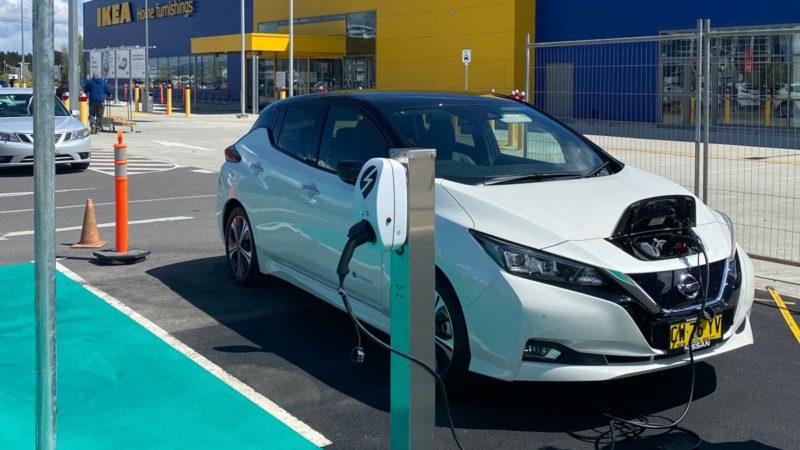ACT drivers will soon be able to access a zero interest loan and free registration for buying an electric vehicle (EV), making it the most EV-friendly jurisdiction in Australia.
Under the new governing agreement inked between the Greens and Labor, households can apply for a loan of up to $15,000 to go towards the cost of buying an electric vehicle.
The governing agreement also states that that the first two years registration will be free after the purchase of a new electric vehicle.
ACT already offers zero stamp duty for buying an electric car, and according to data from the Australian Bureau of Statistics, has the highest proportion of Tesla electric cars (which pretty much means all electric cars, since Tesla accounts for as much as 80% of the Australian EV market) per capita.
Even the most affordable electric cars in Australia are typically $20,000 more than their combustion vehicle equivalent counterparts, but this new policy effectively narrows the gap.
There are just a handful of EVs available in Australia for under $50,000 currently, including the $48,490 Hyundai Ioniq, the $49,990 Nissan Leaf, and the recently launched MG ZS EV which is now the cheapest EV in Australia at $40,990 (all prices are before on-road costs).
The new zero emissions vehicle incentives included in the governing agreement aim to assist the territory in its goal to phase out all fossil fuels by 2045.
But they are somewhat watered down from the original Greens pre-election promise that it would offer $10,000 in grants to businesses and drivers wanting to buy an electric vehicle.
Instead, the new governing agreement brings electric vehicles under the pre-election Labor plan to offer loans to households to help drive down the cost of energy and reduce carbon emissions.
Still, the Greens strong performance at the recent ACT election means it has garnered sufficient support to implement some of its “rEVolution” plan that includes a policy intention of 90 per cent new car sales to be electric by 2030 and 100 per cent by 2035.
The strong support for electric vehicles in the ACT, like Tasmania’s 100 per cent government EV fleet pledge on Friday, is in stark contrast the anti-EV approaches of other jurisdictions.
In South Australia and New South Wales, governments may slug electric vehicle drivers with a road user tax despite the fact they are already paying a higher price for a technology that helps reduce societal costs like climate change and health.
The ACT agreement will also see 50 new electric vehicle charging sites installed across the territory, stipulations put in place to ensure new buildings are EV-ready, and pledges to stick to a plan to transition the state’s 90-strong bus fleet to zero emissions drivetrains.
The full wording of the ACT governing agreement includes the following:
- 1i. Implement a program of zero-interest loans of up to $15,000 for households and not-for-profit community organisations to assist with the upfront costs of investing in: rooftop solar panels; household battery storage; zero emission vehicles and efficient electric appliances. The program will include an education and communications component about energy efficiency and the shift from gas to electric.
- 2ii. Provide financial incentives for the purchase of zero emission vehicles. This includes free vehicle registration for new zero emission vehicles for two years, introduced as soon as practical.
- 2v. Build at least 50 electric vehicle recharging stations across Canberra and the region, holding a reverse auction for their construction in 2021-22. This will include working with service station providers to explore broader public charging infrastructure
- 3i. Adopting an ACT Appendix to the Building Code of Australia in conjunction with the Territory Plan Review, which will set out improved sustainability standards that all new buildings must meet (addressing issues such as insulation, glazing, passive design, phasing out gas, and the requirement for electric vehicle charge points).
- 6. Alongside the initiatives on zero emission vehicle incentives outlined in the Agreement, the Government will continue to transition Canberra’s entire public bus fleet to zero emissions by buying 90 battery electric buses in the next term, building a new zero-emissions bus depot in Canberra’s North and building electric bus infrastructure at the new Woden Depot

Bridie Schmidt is associate editor for The Driven, sister site of Renew Economy. She has been writing about electric vehicles since 2018, and has a keen interest in the role that zero-emissions transport has to play in sustainability. She has participated in podcasts such as Download This Show with Marc Fennell and Shirtloads of Science with Karl Kruszelnicki and is co-organiser of the Northern Rivers Electric Vehicle Forum. Bridie also owns a Tesla Model Y and has it available for hire on evee.com.au.

